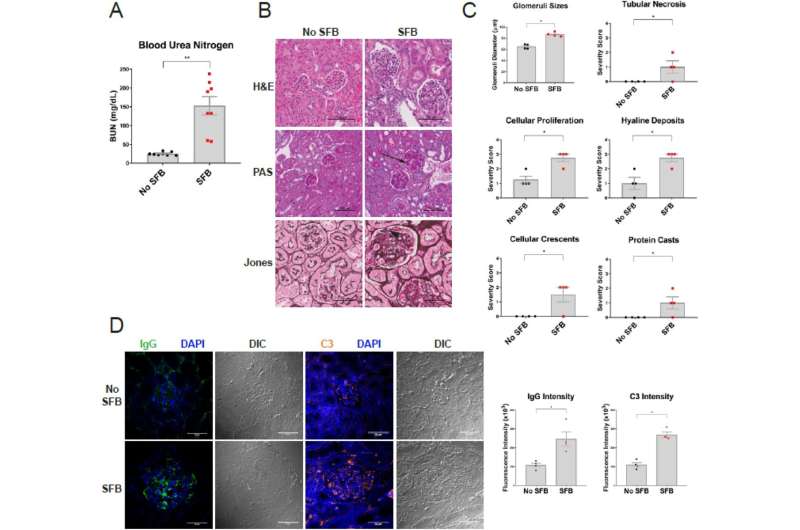
Research led by The Ohio State University Wexner Medical Center and College of Medicine found that introducing a single bacterium called segmented filamentous bacteria (SFB) to the gut microbiota causes detrimental effects on lupus nephritis in mice.
Study findings are published in the journal Scientific Reports.
“This is a major finding, because it provides a basis for future studies that will examine the effects of interventions that target the gut microbiota in the management of lupus,” said lead author Dr. Wael Jarjour, a rheumatologist and director of the Division of Rheumatology and Immunology at Ohio State.
Lupus is an autoimmune disease in which the body’s immune system attacks the body’s own cells and organs. Lupus affects predominantly young women and can be associated with significant internal organ damage.
The Lupus Foundation of America estimates that 1.5 million Americans—and at least five million people worldwide—have a form of lupus. Men, children and teenagers also can develop this complex disease, and factors like genetics, hormones and the environment play a role in making an individual at risk for lupus.
“One of the environmental factors that plays a role is the various bacteria found in the gut, otherwise referred to as the gut microbiota. We examined the effects of a specific bacterium called segmented filamentous bacteria (SFB) in a lupus mouse model and demonstrated that the introduction of this bacterium causes severe worsening of lupus nephritis, a type of kidney disease caused by systemic lupus,” Jarjour said.
Colonization of these mice with this bacterium greatly enhances inflammatory kidney lesions, he said. The intestinal wall normally provides a barrier similar to skin, but it becomes “leaky” once this bacterium is introduced, thus allowing some material in the intestine to leak into the circulation. SFB also alters other types of bacteria that form the microbiota in these mice, resulting in a loss of the normal balance of different bacterial species, Jarjour said.
“This bacterium has been shown to be important in rheumatoid arthritis models, and we wanted to examine its effects in lupus. Our research establishes a mouse model to test various approaches to restore gut microbiota balance,” said first-author Giancarlo R. Valiente, who is a graduate of the Medical Scientist Training Program at The Ohio State University.
Source: Read Full Article
